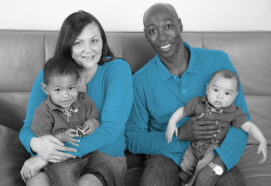In this Papers Podcast, Emma Francis and Dr. Jessie Baldwin discuss their co-authored JCPP paper ‘Subjective and objective experiences of childhood adversity: a meta-analysis of their agreement and relationships with psychopathology’ (https://doi.org/10.1111/jcpp.13803).
There is an overview of the paper, methodology, key findings, and implications for practice.
Discussion points include:
- Why they focused on subjective and objective experiences of childhood adversity in this research.
- A definition of subjective measure of childhood adversity.
- A definition of objective measures of childhood adversity.
- The number of studies identified in their systematic search and what these included.
- The implications of this study from a research perspective.
- The implications of this study from child and adolescent mental health practitioner perspective.
- Potential misconceptions about this research.
In this series, we speak to authors of papers published in one of ACAMH’s three journals. These are The Journal of Child Psychology and Psychiatry (JCPP); The Child and Adolescent Mental Health (CAMH) journal; and JCPP Advances.
Subscribe to ACAMH mental health podcasts on your preferred streaming platform. Just search for ACAMH on; SoundCloud, Spotify, CastBox, Deezer, Google Podcasts, Podcastaddict, JioSaavn, Listen notes, Radio Public, and Radio.com (not available in the EU). Plus we are on Apple Podcasts visit the link or click on the icon, or scan the QR code.

Emma Francis is a PhD Candidate on the prestigious University College London-Birkbeck Medical Research Council Doctoral Training Programme. She is based at the Department of Clinical, Education and Health Psychology, University College London. Her research uses genetically informative approaches to understand the relationship between objective and subjective experiences associated with mental health. Outside of her PhD, Emma campaigns to raise awareness of the importance of equality, diversity and inclusivity in higher education.

Dr. Jessie Baldwin is a senior research fellow at University College London, funded by the Wellcome Trust. Her research focuses on understanding the role of adverse childhood experiences in mental health, with a particular focus on measurement and causal inference.
Other resources
- Featured paper ‘Subjective and objective experiences of childhood adversity: a meta-analysis of their agreement and relationships with psychopathology’, (2023). Emma R. Francis, Anna Tsaligopoulou, Sarah E. Stock, Jean-Baptiste Pingault, Jessie R. Baldwin
Transcript
[00:00:00.099] Mark Tebbs: Hello, and welcome to the Papers Podcast series for the Association of Child and Adolescent Mental Health, or ACAMH for short. I’m Mark Tebbs, I’m a Freelance Consultant and Leadership Coach. In this series, we speak to authors of papers published in one of ACAM’s three journals. These are the Journal of Child Psychology and Psychiatry, commonly known as JCPP, the Child and Adolescent Mental Health, known as CAMH, and JCPP Advances.
Today, I’m delighted to be interviewing Dr. Jessie Baldwin, who is a Henry Wellcome Post-Doctoral Fellow working in the Department of Clinical, Education and Health Psychology at UCL, and Emma Francis, who is a final year PhD candidate on the UCL Birkbeck Medical Research Council Doctoral Training Programme, also based at the Department of Clinical, Education and Health Psychology at UCL.
Emma and Jessie are co-authors, with Anna Tsaligopoulou, Sarah Stock and Jean-Baptiste Pingault, of a paper entitled “Subjective and Objective Experiences of Childhood Adversity: A Meta-analysis of their Agreement and Relationship with Psychopathology,” recently published in the JCPP. Emma and Jessie, thank you for joining me.
[00:01:14.030] Emma Francis: Thanks for having us.
[00:01:15.400] Dr. Jessie Baldwin: Yes, hello.
[00:01:16.540] Mark Tebbs: So, can you start with an introduction of who you are, what you do, and maybe how you came to work together on this study?
[00:01:24.049] Emma Francis: So, I’m Emma Francis. I’m a final year PhD candidate studying psychiatric epidemiology and genetics at University College London, and this paper we’re about to discuss was my first PhD paper, and Dr. Jessie Baldwin is one of my PhD Supervisors who supported me with this.
[00:01:39.509] Dr. Jessie Baldwin: And I’m Dr. Jessie Baldwin, and I’m a Senior Research Fellow at UCL, and my research focuses on investigating the relationship between adverse childhood experiences and mental health problems. And I’m particularly interested in understanding how the measurement of childhood adversity can affect the relationships with mental health, which led us to conducting this study.
[00:01:58.799] Mark Tebbs: Excellent. So, let’s turn to that paper. Could you just start by giving us a brief overview of the paper and tell us why you wanted to study the Subjective and Objective Experiences of Childhood Adversity?
[00:02:09.560] Emma Francis: We know that childhood adversities, such as being bullied, childhood maltreatment, are risk factors for adverse mental health. To study the effect of childhood adversities, often, Researchers use both subjective self-reports and objective measures, such as child protection records. However, it remained unclear as to, firstly, whether these measures showed agreement, in other words, they can be used interchangeably, and secondly, whether the risk for mental health problems is driven by the subjective or objective experience of childhood adversity. To address this, we conducted a meta-analysis to examine the agreement between subjective and objective measures of childhood adversity and their prediction of mental health problems.
[00:02:51.349] Mark Tebbs: But before we get into the detail, I think it’d be really helpful for us just to, kind of, define some of the key terms, maybe particularly the, kind of, subjective and objective measures.
[00:03:01.600] Dr. Jessie Baldwin: Sure. So, we defined subjective measures as assessments that capture an individual’s perception of their experiences of childhood adversity. So, these were things captured through self-report interviews or questionnaires. And in contrast, we defined objective measures as assessments that are unlikely to be affected by a target individual’s own perception of their experiences. So, examples of objective measures included official records, such as child protection records, crime records or medical records, for example, indexing exposure to child maltreatment, and we also considered reports derived from multiple individuals who are not directly related to the target individual. So, for example, to assess bullying, victimisation, objectively, we considered peer nominations, which are collected from multiple children in a classroom, as part of the objective measures.
[00:03:54.329] Mark Tebbs: Could you just tell us a little bit more about the methodology you used for the study?
[00:04:01.080] Emma Francis: Of course. We conducted a pre-registered meta-analysis. So, a meta-analysis is, essentially, a method of combining results from multiple different studies to produce an overall pooled result, and to identify studies, we conducted a systematic search of three online databases and reviewed over 4,000 articles to assess whether they were relevant.
[00:04:23.049] Mark Tebbs: So, how many studies did you actually identify and what did these include?
[00:04:27.770] Dr. Jessie Baldwin: So, from the systematic search of over 4,000 articles, we identified 22 studies, which included over 18,000 participants, that reported data on the agreement between objective and subjective measures of childhood adversity. And we also identified 17 studies that included nearly 15,000 participants, which examined the relative associations between subjective and objective measures of childhood adversity with mental health problems. And these studies focused on subjective and objective measures of a number of different childhood adversities, including childhood maltreatment, bullying, victimisation and neighbourhood adversity.
[00:05:08.970] Mark Tebbs: And what were the key findings from the study? What were the things that really, kind of, stood out for you?
[00:05:14.449] Emma Francis: So, there were two main, key findings that stood out for us. The first one is that we found that there were only moderate agreement between objective and subjective measures of childhood maltreatment, bullying, victimisation and neighbourhood adversity. And the second was that subjective self-report measures of childhood adversities were associated with mental health problems, independent of objective measures. But in contrast to this, objective measures of childhood adversities had null or minimal associations with mental health problems, independent of the subjective measures.
[00:05:48.580] Mark Tebbs: Okay, so what are the implications of this kind of study from, maybe from a, kind of, research perspective, first of all?
[00:05:56.220] Emma Francis: Well, paper highlights that subjective and objective measures are not interchangeable and are differentially associated with psychopathology. Where both subjective and objective measures of childhood adversity are available, we would recommend that Researchers use both measures and test their relative associations with mental and physical health to advance our understanding of the role of subjective versus objective experiences in health outcomes.
[00:06:23.210] Mark Tebbs: And what about from a, sort of, CAMH practitioner perspective?
[00:06:27.650] Dr. Jessie Baldwin: Well, assuming that the subjective experience of childhood adversity really drives the risk for mental health problems, this suggests that therapeutic approaches, which address perceptions and memories of childhood adversities, could help to reduce and prevent mental health problems in individuals exposed to childhood adversities. And in particular, our findings highlight the value of existing cognitive therapies, which can address aspects of the subjective experience that might drive the risk for mental health problems, such as harmful recollections or memories, or beliefs about the self or others that might have been triggered by these experiences.
[00:07:05.860] Mark Tebbs: And is there anything else in the paper that you would like to highlight?
[00:07:09.740] Emma Francis: Yes, actually. So, we also found some interesting moderation results. For example, we found that the association between subjective measures of childhood adversity and mental health was greater when mental health was self-reported, relative to when it was reported by another informant. Additionally, the effect of subjective measures of childhood adversity on mental health was greater in cross-sectional studies compared to longitudinal studies.
[00:07:35.870] Dr. Jessie Baldwin: We’d also like to highlight a couple of potential misconceptions about this research. So, firstly, our findings don’t imply that objective experiences of childhood adversity aren’t important or don’t impact mental health. Instead, it’s likely that these objective experiences of childhood adversity affect a person’s memories and perceptions of those events, which in turn, drives their risk for mental health problems.
And secondly, our findings that show low agreement between subjective and objective measures of childhood adversity don’t suggest that subjective self-reports of childhood adversity aren’t valid. There could be low agreement between these measures, because the so-called objective measures might miss some true cases of childhood adversity. So, for example, official records only capture the most severe cases of maltreatment, but we really need more research to understand what contributes to the low agreement between these two measures.
[00:08:30.599] Mark Tebbs: You mentioned more research. Are you planning any further research? Is there anything in the pipeline that you would like to share with us?
[00:08:38.289] Emma Francis: So, the remaining projects for my PhD will use genetically informed approaches, such as the use of polygenic scores, to understand, for example, whether someone’s genetic liability to adverse mental health is associated with subjective reporting of experiences over and above that of objectively reported experiences.
[00:08:57.290] Dr. Jessie Baldwin: And we’re also conducting some more meta-analytic work investigating whether the timing of measures of childhood adversity affects the relationships with mental health problems. So, specifically, we’re comparing prospective versus retrospective measures. So, watch this space for these future studies.
[00:09:15.089] Mark Tebbs: Excellent, thank you. So, finally, what’s your take home message for our listeners?
[00:09:20.160] Dr. Jessie Baldwin: Well, to reiterate the two key findings from this study. Firstly, we found that subjective and objective measures of childhood adversities are only moderately correlated and secondly, that subjective measures of childhood adversities are associated with mental health problems independently of objective measures. Whereas objective measures show null or minimal associations with mental health problems, independently of subjective measures.
[00:09:45.899] Emma Francis: Our findings have a positive message, as although it’s not possible to prevent childhood adversities that have already happened, our findings suggest that therapies addressing perceptions and cognitions about the experience can reduce the risk for mental health problems.
[00:10:01.769] Mark Tebbs: Thank you so much for your time this morning, Emma and Jessie. For more details on Emma Francis and Dr. Jessie Baldwin, please visit the ACAMH website, www.acamh.org, and at Twitter @acamh. ACAMH is spelt A-C-A-M-H, and don’t forget to follow us on your preferred streaming platform, let us know if you enjoy the podcast, with a rating or review, and do share with friends and colleagues.




